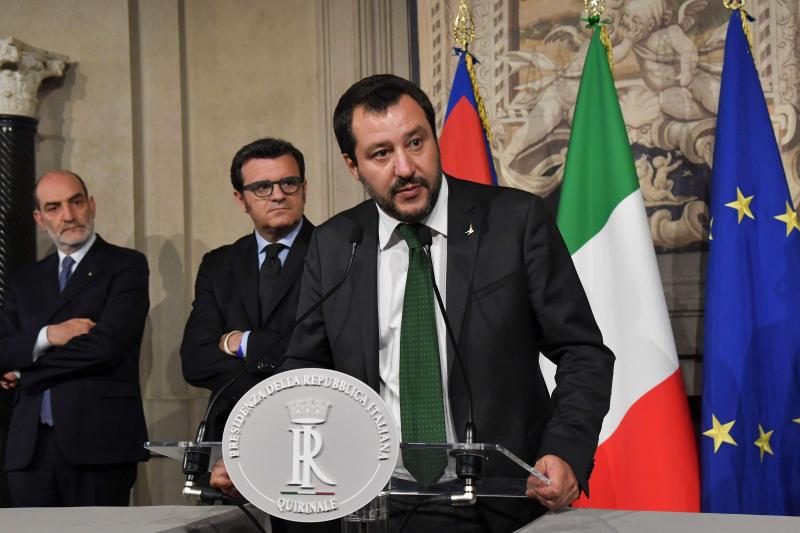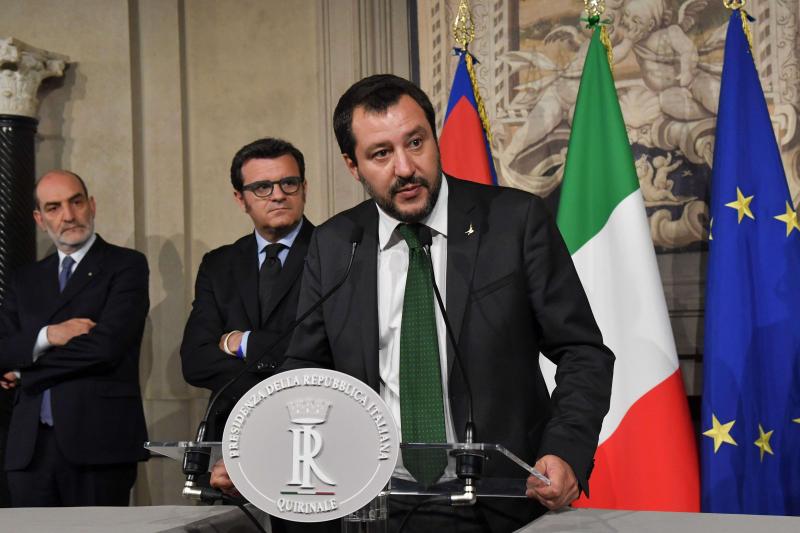Italy’s politics have Euro-Mediterranean ramifications
Europe faces a paradox with the incoming Italian government.
The coalition partners are the anti-establishment Five Star Movement led by Luigi Di Maio and the League led by Matteo Salvini. Both parties are very much anti-establishment and have long sneered at unelected technocrats taking power; yet, following weeks of wrangling, they have put forward Giuseppe Conte, 53, as their preferred prime minister.
The next Italian prime minister may not be a household name but, after earning his law degree at the Sapienza University in Rome, he studied at Yale and the Sorbonne. He has positions at the University of Florence and Luiss University in Rome. He has had high-profile posts, including a seat on the council that regulates Italy’s administrative judiciary and led a special committee that investigated sexual harassment allegations against Francesco Bellomo, a senior judge. He has worked with the World Bank’s former senior economist, Joseph Stiglitz.
Technocrats have governed Italy before. Two recent prime ministers, Carlo Azeglio Ciampi (1993-94), a former central bank governor, and Mario Monti (2011-13), a former EU commissioner, served the country with great skill. They led emergency administrations and had considerable knowledge of Italian institutions and how they worked.
Such is not the case with the prime minister-designate. Conte will be a political prime minister of a political government, chosen by two political forces within it.
Salvini is likely to be appointed interior minister — to oversee a planned crackdown on immigration — and Di Maio would head the ministries of labour and economic development. The policies of the first would directly affect Mediterranean countries and beyond as Salvini is determined to crack down on migrant arrivals, be they irregular migrants, asylum seekers or refugees who cannot legally justify their presence in Italy and those who have a criminal record. Repatriation orders will increase.
Salvini’s speeches are overtly racist and for years the League argued that it wanted to set up an independent Padania in northern Italy to stop all the “scroungers” in the Mezzogiorno, where the Five Star supporters live, from feeding off the wealth of their richer brothers. The “scroungers” are from the southern and eastern shores of the Mediterranean and beyond in Afghanistan. Salvini is determined to do all he can to bring the flow down. He can look his EU partners in the eye.
The International Organisation for Migration said that, in 2015, 153,000 immigrants arrived in Italy via the Mediterranean (857,000 in Greece); in 2016, 181,000 (in Greece 176,000) and, in 2017, 111,000 (Greece 27,000). Among those who arrived in Greece were a greater proportion of people from the Middle East, Afghans and Pakistanis and fewer Africans.
Among Rome’s major European partners — France in particular — few have shown solidarity with Italy, which has been left to bear the financial, economic and sanitary burden of the arrival of tens of thousands of destitute people. It is worth recalling that, as of 2016, and after Germany (8.6 million) and the United Kingdom (5 million-6 million), Italy is the EU country that boasts the most foreign nationals (5 million), before Spain (4.4 million) and France (4.4 million).
This has left a bitter taste in the mouth of Italians, who were less well-placed to absorb large numbers as their economy has, since the financial crisis of 2008, shrunk. Germany, where the net flow of refugees has been larger, has witnessed steady economic growth.
Each European country is different but what is not in doubt is that economic stagnation kindles fears of “being invaded.” In its modern history, Italy has not had, until recently, a large stock of immigrants — certainly a much smaller one than France, the United Kingdom or Germany, let alone Spain.
The provenance of those immigrants, their religion and their lack of resources have, when combined with an economy in crisis, produced a perfect political storm. The result of the Italian elections needs to be seen in context.
Thousands of immigrants are waiting in camps to be regularised; others are working as virtual slave labourers in the fields of southern Italy; others camp in derelict areas on the edge of major cities. The indifference of Europe, the cynical — not to say callous — reaction of countries such as France that have not shared the burden of the refugees has not been received well by the Italians.
Over the past year or so, Italian authorities have made deals with power brokers in Libya that have stemmed the flow of migrants from that country. Italy is all the more sore for not having supported the French-led NATO-backed military intervention in Libya in 2011. That turned Libya into a failed state and unleashed an unprecedented wave of immigrants across the Mediterranean.
One can expect to see the new government in Rome confront the European Union on immigration and on foreign affairs, which, in the Mediterranean, are closely bound. Italy’s relations with Tunisia, Egypt and Algeria should not suffer as North Africa, outside of Libya, controls its borders pretty well. That said, mass deportation from Italy is not a realistic option.
How Italy fares economically will also affect Maghreb countries with which it has long-standing economic and energy ties. Unlike Greece, Italy is too big to fail but maybe too big to save. Its $4.4 trillion public debt is seven times bigger than Greece’s, the largest in the eurozone and fourth largest in the world. Were Italy to crash out of the euro, the economic shock waves would be felt across Europe and North Africa.
This article was originally published in The Arab Weekly.







